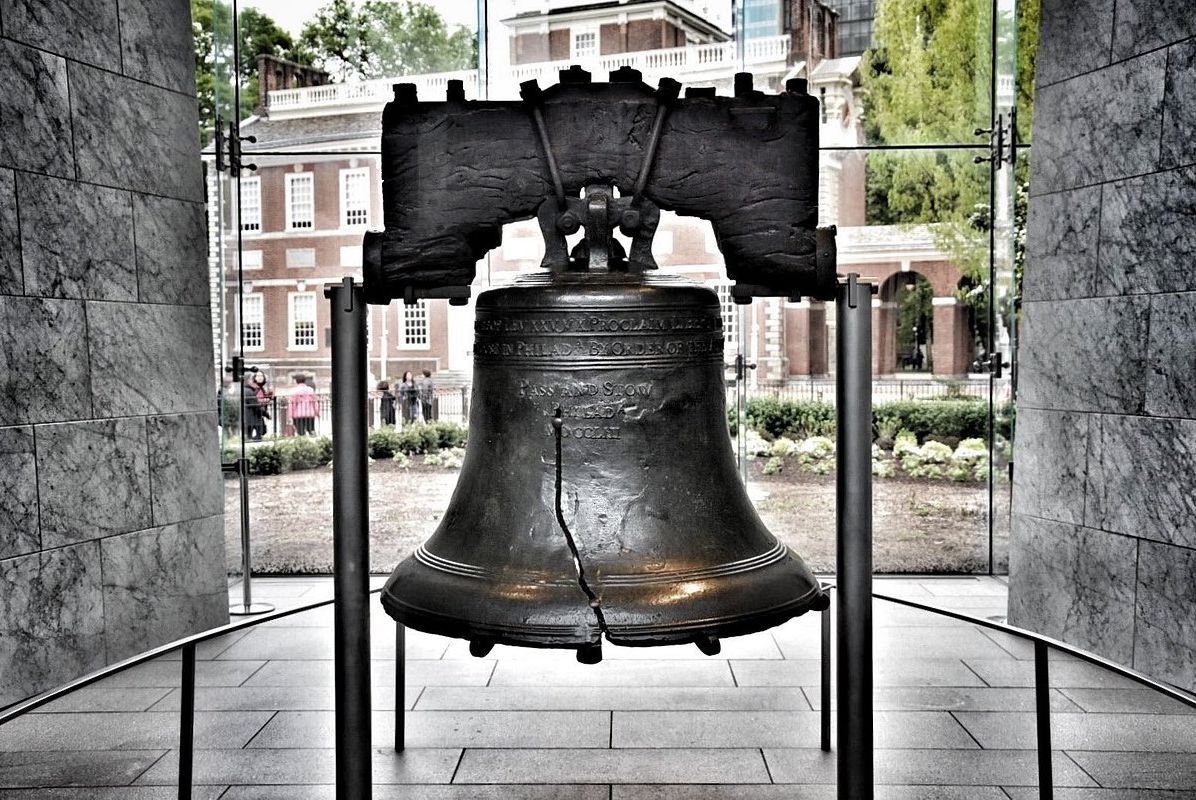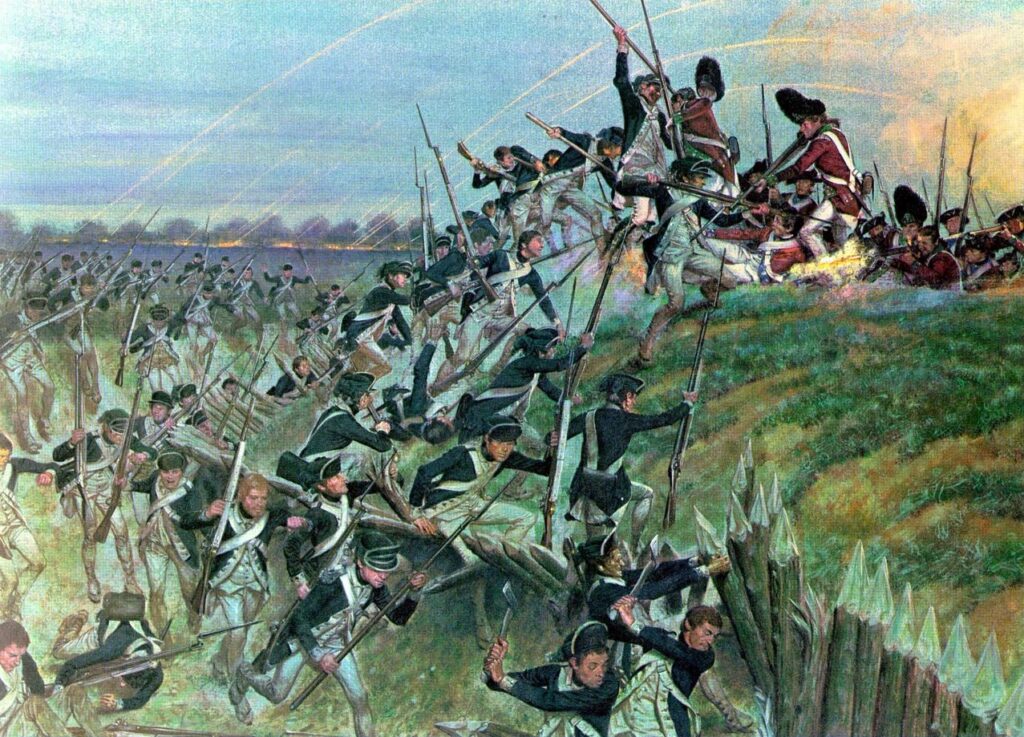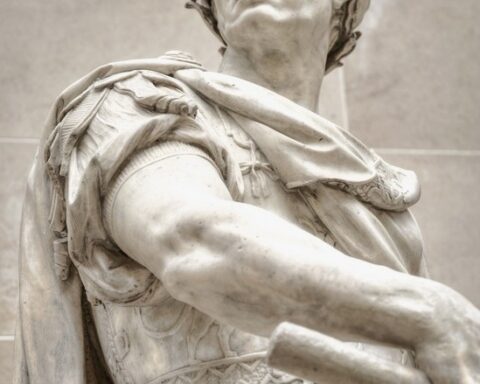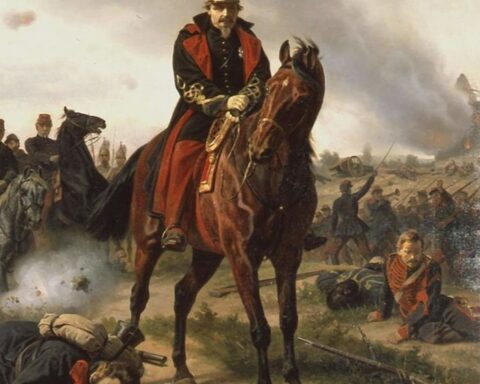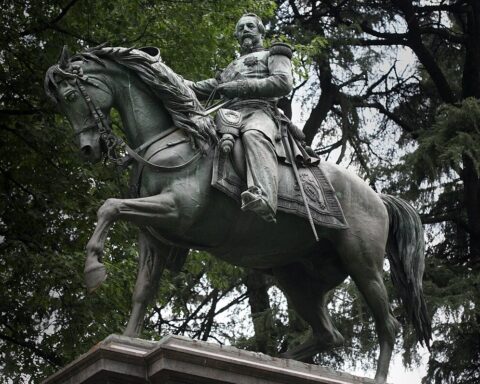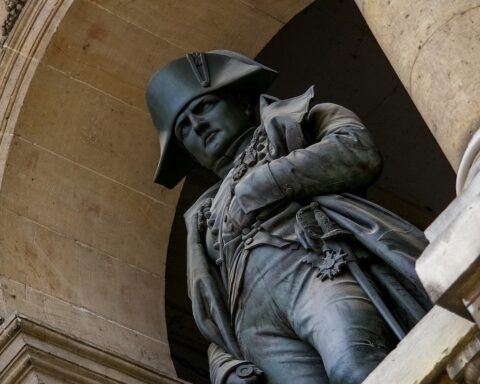Editor’s note: The following — a British perspective on the American Revolution — is extracted from The United States: An Outline of Political History, by Goldwin Smith (published 1893).
(Continued from Part 5)
The good effects of the American revolt on British politics have it would seem been overrated. Whatever Chatham or any one else might say in his oratoric mood, there was little danger of the enslavement of Britain by means of a colonial stamp act or a colonial duty on tea. For that the Whigs and the people were too strong. On the other hand, a few years after Yorktown the king was able to set his foot on the neck of the Whig party by his personal nomination of Pitt, and Toryism reigned thenceforth with hardly a break for forty years. England’s colonial system also remained unchanged till with all the other parts of British government it felt the tide of returning Liberalism, which carried the Reform Bill. In truth, defeat in anything like a British cause was not likely to entail on the monarch a forfeiture of British hearts, and it was in a British cause that Rodney and Eliot at all events had conquered, while it was before French arms that Cornwallis had fallen.
What is called the American revolution was not truly a revolution but a separation. The colonists had taken up arms as they averred for chartered right, not for constitutional change. Nevertheless a gradual revolution ensued. The colonists had broken away from monarchy, they had learned to hate it and everything connected with it, they had been steeped in republican sentiment; they had expelled the monarchical, aristocratic, and hierarchical elements and tendencies of the community. So strong had the feeling already become against anything hereditary or aristocratic, that the foundation of “The Cincinnati,” an hereditary brotherhood of the officers who had fought in the war and their descendants, brought on a storm. From the British Parliament supreme power had passed to the legislatures of the several States. The States had reorganized themselves in the cases where it was necessary on a republican footing. Their constitutions after some experimental oscillations assumed in process of time nearly the same form, each having as its executive, in the place of a royal governor or the vice-regent of its proprietary, an elective governor with a veto not absolute like that of the crown but suspensive, and a legislature consisting of two houses, a Senate which succeeded to the old Council, and an Assembly; both houses being elective, but the conditions of election to the Senate and the tenure of seats in it being such as to render it rather a conservative and revising body, while the Assembly was the direct expression of the popular will. This was in fact the old English model as it was understood to be, with the omission of the hereditary element. In almost all the states there had been up to that time a property qualification of some sort for the franchise. Gradually in the succeeding years these qualifications were abolished and manhood suffrage prevailed. This, apart from deliberate policy, the bidding of politicians against each other for popular support was sure to bring to pass. The elective principle was unhappily extended in time by most of the states to the judiciary, Georgia setting the bad example which Massachusetts was wise enough always to refuse to follow. The common law of England remained and still remains the basis of American law. Even the technicalities of its pleading system have in some American states partly survived their abolition in the old country. But the legal supports of territorial aristocracy, primogeniture and entail, disappeared. With them departed the last relics of the manorial system; that of freehold farms — territorial democracy, as it has been called — everywhere prevailed, and New York ceased to pay homage, ultimately she ceased to pay quit-rents, to her patroons. The Church establishments, alike that of Congregationalism in Massachusetts and that of Anglicanism in the Southern and Middle States, passed away and gave place to religious equality, though a state profession of Christianity with some legal safeguards for religion lingered on and lingers still, especially with regard to the observance of Sunday. Congregational establishment in the North somewhat survived Anglican establishment in the South, because the first was popular, the second aristocratic. Churches which had been established took up their position as free churches, a process in which the Church of England marked her singularly political character, for the English episcopate could consecrate no one as bishop who had not taken the oath to the crown, and for the consecration of an American bishop it was necessary to have recourse to the free Anglican episcopate of Scotland.
Apart from specific change, constitutional, legal, or ecclesiastical, there was a general change of ideas as to the origin, foundation, and authority of government. The court which had been paid to the king was henceforth to be paid to the sovereign people. To the sovereign people all loyalty was henceforth due. Against the sovereign people only could treason be committed. That treason could be committed against the sovereign people even more easily than against a king, was the opinion of Samuel Adams, who in opposing the extension of mercy to some convicted insurgents laid it down that in monarchies the crime of treason or rebellion might admit of being pardoned or lightly punished, but the man who dared to rebel against the laws of a republic ought to suffer death.
The five years which followed the final separation of the colonies from the mother country have been justly called the critical period of American history. Imperial unity had departed, national unity had not taken its place. The bond of mutual danger, weak enough even while the danger lasted, had departed with the return of peace. Congress, originally the organ of a war league and invested only with war or diplomatic powers, was politically a shadow. Its army had been broken up, its currency had lost all value, to raise money it was driven to such expedients as drawing on its foreign ministers and selling the drafts for cash. It was unable to keep its word to the scarred veterans who had fought for it. Its financier, the banker-statesman Robert Morris, struggled with its embarrassments nobly but in vain. It had not the means of protecting the lives or property of its citizens on the high seas. A handful of mutineers turned it out of doors. Reduced to ignominious impotence at home it could not command respect abroad, nor could England or any foreign nation be justly upbraided by Americans with slighting a government which Americans themselves almost spurned. Valid treaties could not be made with a government which had no means of punishing their infraction. Seeing the confusion, some of the army officers would have made Washington king, but he more decisively and sincerely than Cæsar or Cromwell put away the crown. The States were scattered along nine hundred miles of coast, broken by many impediments to travel. They had little intercommunication. Their interests and feelings were still strongly local in spite of their partnership and the comradeship of their soldiers during the war. Among the public men who had taken a leading part in the struggle for independence and among the Continental veterans there might be a community of sentiment, but on the whole the centrifugal forces prevailed and were gaining strength. State selfishness manifested itself with violence, especially in the case of New York. It was becoming fatal even to commercial unity. States fell foul of each other. There were disputes about territory, and in a contest between Pennsylvania and Connecticut for the possession of Wyoming that hapless settlement was a second time devastated, and with cruelty only less than that of the Indians and Tories. Such a dissolution and such a collapse of public spirit are not the usual sequel of a struggle for a great cause, the tendency of which on the contrary is to elevate, brace, and unite. Grievances and discontent were rife. Commerce, almost ruined by the maritime war, was now weltering in the slough of a debased paper currency into which individual States were wading deeper still. There was a heavy burden of private as well as of public debt. Men were being dragged to debtors’ prisons. The community was vexed by litigation and the enforcement of odious claims. Gambling speculation flourished, as it always does when the currency is deranged, and the people were incensed by the sight of its shameful gains. The spirit of repudiation was abroad. Scarcity appeared and food riots with it. At length law-loving Massachusetts became the scene of a dangerous rebellion of the indebted and suffering class under the leadership of Daniel Shays, formerly a captain in the Continental army, who in common probably with many of his comrades had been reduced to want by the failure of the public faith.
Shays’ rebellion gave a salutary shock. Anarchy was evidently at hand. To avert it a convention met to give the country a government by framing a constitution. The president of the convention was Washington, who, the war ended, had sought retirement and domestic happiness at Mount Vernon sincerely but in vain. Personal confidence in him it was in great measure that made the convention possible and enabled it to do its work. Once more and not for the last time he saved the state. When the servile dread of popular opinion which is the bane of popular government began to show itself, he rose from his chair and said, “It is too probable that no plan we propose will be adopted. Perhaps another dreadful conflict is to be sustained. If to please the people we offer what we ourselves disapprove, how can we afterwards defend our work? Let us raise a standard to which the wise and honest can repair; the event is in the hand of God.” “These words,” says an eminent writer, “ought to be blazoned in letters of gold and posted on the wall of every American assembly that shall meet to nominate a candidate or declare a policy or pass a law, so long as the weakness of human nature shall endure.” If it could only be shown how the politician is to act in this spirit, while to him the pleasure of the changeful multitude is life and its displeasure is death! The leading minds of the convention were Franklin, Hamilton, Madison, Rufus King, Robert Morris, Gouverneur Morris, Pinckney, Oliver Ellsworth, Elbridge Gerry, James Wilson, and Roger Sherman — sagacious and experienced men of business, like the men of whom the American Senate is now composed, and far unlike the men to whose lot it unhappily fell to frame a constitution for revolutionary France. Jefferson, the author of the Declaration of Independence, whose opinions were French and revolutionary and whose influence had he been present would have been great, was happily absent as ambassador at Paris. The tendency of the American statesmen was conservative, their mission being to avert dissolution. That their work proclaims their wisdom, the world declares. They founded, if not the first national republic, the first which was destined to endure. The republics of antiquity were cities, and Rome when she became more than a city ceased to be a republic. In the United Netherlands the Stadtholderate was a veiled monarchy. The Commonwealth of England lived but for an hour, though it left what may prove a valuable legacy in the Instrument of Government. The union of the Swiss Cantons was at this time not national but federal, in the strict sense of the term. It has since become national by approximation to the American model.
The problem which the framers of the American constitution had to solve was that of reconciling a strong national government, which was the aim of most of them, with the claims and susceptibilities of separate and in their own eyes sovereign states. The solution of that problem was a nation with a federal structure. The federal parts of the constitution are the recognition of the right of each state to self-government in regard to all ordinary matters of legislation or administration; the equal representation of the states great and small in the Senate, which is placed beyond the power of amendment; and the election of the president through state colleges, the verdict of which may not coincide with that of the majority of votes in the whole Union; the last provision being however of little practical importance. It is also declared in the interest of state right that any power not expressly given to the federal government is withheld and remains in the states or in the people. In the group of states with which the framers had to deal there were differences of size or importance which rendered federation on an equal footing a work of difficulty. Yet there was no towering predominance to excite the permanent jealousy of the rest, as there would be if England were federally united with Scotland, Wales, and Ireland. Whether the constitution was a compact, as parties to which the states retained their independent existence, or an incorporating union in which the independent existence of the states was merged, was a question left by the framers to settle itself and which was ultimately decided by the sword. What is certain is that Congress was not made, like the British Parliament, a sovereign power. The sovereignty remained either in the states or in the united people.
The national part of the constitution was not struck out at a heat as misdirected eulogy avers, but was framed like the constitutions of the several states on the English model, as the English model was in law and was still imagined in fact to be even by the English themselves, with an executive head and a legislature divided into two co-ordinate branches. The elective president was the republican substitute for the hereditary king, and was invested with the executive powers, political, diplomatic, and military, which the king was still supposed to possess. The military command however was to be direct only in the case of the standing army; of the militia, the commanders were to be the governors of the states, to whom the president’s requisition was to be addressed. The Senate was the republican and elective House of Lords, and was like it restrained from originating money bills. The House of Representatives was the House of Commons, the direct expression of the popular will, as well as in this case, the organ of the nation, while the Senate was the organ of the states. The Senators were to be elected by the state legislatures for six years, the members of the House of Representatives were to be elected by the people for only two years; and the Senate was expected, both from the mode of its election and from the length of its term, to be like the upper house of the British Parliament a conservative and revising body. The qualification for the national suffrage was to be the same as that required for electors of the most numerous branch of the legislature in each state, an enactment of which, leaders and parties bidding against each other for popular support, manhood suffrage was the certain offspring. The presidency, after much debate and many changes of mind, was made tenable for four years with the power of re-election, the exercise of which was presently limited by fixed custom to a double term.
The election was not intended to be popular; it was vested in colleges of electors, sage citizens it was supposed they would be, one college for each state. But the election of these colleges for the special purpose inevitably became a mandate, and a presidential election practically by manhood suffrage is now the most extensive display of popular sovereignty in the world. The president was invested with a suspensive veto in place of the veto nominally absolute of the British king, while a share was given to the Senate in the executive power by making its consent necessary to official appointments and to treaties. These were deviations from the revered but impracticable principle of Montesquieu, who had laid it down that the complete separation of the executive, legislative, and judicial powers from each other was the only sure pledge of freedom.
On the other hand, whether in deference to Montesquieu or to the political purism which had given birth to place Bills in the old country, ministers of state were excluded from the legislature. Thus a turn was given to the parliamentary system in America different from that which had been taken by the parliamentary system in England, though almost without the knowledge of Englishmen themselves. Cabinet government was precluded. Instead of a ministry responsible to the legislature, and dependent for existence on its vote, America has a ministry independent of the legislature and irremovable during its term of four years. Instead of the control exercised over legislation by the ministers sitting in Parliament, America has controlling committees nominated in the House of Representatives by the Speaker, who is thus not merely the chairman but the party leader of the House. In the Senate there can hardly be said to be any initiative or control, except that of party organization or individual influence.
Of government by party, in which their settlement was destined to result, the framers of the constitution appear not to have thought, though they had an example of it before them in the British Parliament. That organized party would be the dominant force acting under the forms of the institutions which they framed did not, so far as we can see, occur to their minds. In this most momentous respect their foresight failed.
The states were prohibited from laying import or transit duties on each other’s goods. Internal free trade was thus secured to the whole of the continent occupied by the United States. This was practically the greatest of all the measures of free trade in commercial history.
For the amendment of the constitution two processes were assigned, the initiative being given either to two-thirds of both Houses of Congress or to the legislatures of two-thirds of the states. Both processes are so difficult, especially when the Union is divided into parties, as to carry conservatism almost to the length of immobility. There was no amendment during a period of sixty years.
The interpretation and legal guardianship of the constitution were vested in a Supreme Court, the judges being appointed by the President with consent of the Senate.
In the constitution, or in additions soon after made to it by way of amendment, are provisions which taken together constitute a republican Bill of Rights. A republican constitution is guaranteed to each of the states, no titles of nobility can be granted, no religion can be established, no religious tests for office can be imposed; speech and the press are to be forever free, liberty of public meeting and of petition are secured, trial by jury is to be every man’s right; acts of attainder, ex post facto laws, or laws impairing the faith of contracts are not to be passed; no private property is to be taken by the state without compensation; that military usurpation may be rendered impossible, all freemen are permitted to carry arms.
The adoption of a federal senate with a national house of representatives was a compromise for the sake of union between the claims of the states and those of the nation. The clauses of the constitution respecting slavery were a compromise for the sake of union between the freedom which prevailed in the North and the slavery which prevailed in the South. In the northern and central states since the revolution emancipation had been making rapid progress. Vermont led the way in legislative prohibition. Massachusetts judicially applied to the negro the principle of equal rights embodied in the Declaration of Independence, much as in England slavery had been judicially interdicted in the case of Somerset. Elsewhere liberal sentiment had practically prevailed. In the southern states there were politicians who saw the danger of slavery and philanthropists who condemned its iniquity. But the economical conditions which fostered it were too strong and were destined soon to be fatally reinforced. In the apportionment of representation the South was allowed by the Fathers of the constitution to count three-fifths of its slaves. A fugitive slave law was introduced and the Union is pledged to lend its forces for the suppression of slave insurrection. The existence of the slave trade was secured for twenty years. Soon after the adoption of the constitution, Kentucky was admitted as a slave state and two fugitive slaves were arrested at Boston. The names “slavery,” “slave,” and “slave-trade” are avoided; those of “persons held to service or labour,” “importation and migration” are used instead. But the veil of language betrays consciousness without hiding the guilt. Compromises of expediency may well be wise, compromises of principle always fail. We know now of what upas tree[1] the germ was planted here. This was the first of three great compromises with slavery for the sake of union.
The convention sat with closed doors, as every assembly must if it means really to deliberate, not to talk to the gallery and the reporters. In this case it was most necessary that the debate should be perfectly free, and that the work should come complete before the people. But the substance of the discussion has been preserved in authentic notes and nothing in political archives is more important. In overcoming the opposition, constitutional or arising from the local fears and jealousies of different states, there was abundant work for personal authority, statesmanship, address, and eloquence both of the tongue and pen. Among the opponents of union were Samuel Adams and Patrick Henry, the latter of whom, if the evidence of his opponents is to be believed, appealed without scruple to all motives. Pamphleteering abounded on both sides and the controversy gave birth to one memorable work, “The Federalist,” of Hamilton, Madison, and Jay. Unluckily “The Federalist” is mainly taken up with allaying the fears, proved by the event to be groundless, of those who fancied that the power of government would be too great, while with the real dangers, democratic passion, demagogism, and factions, it omits to deal.
Provision was made by the constitution for the government. Provision for expansion had been made by a resolution of the old Continental Congress which declared that the demesne or territorial lands “should be disposed of for the common benefit of the United States, and be settled and formed into distinct republican states, which shall become members of the federal union, and have the same rights of sovereignty, freedom, and independence as the other states.” Virginia and other states had conceded to the confederacy the vast tracts to which they laid claim between the Alleghanies and the Mississippi, and for the settlement and political organization of these tracts an ordinance had been made in 1787 second in importance only to the constitution. The nomination of a governor by the president and the election of a rudimentary legislature formed the provisional process by which the territory was to be prepared for admission as a state to the Union by an Act of Congress when its population should have become sufficient, and provided Congress approved its constitution. By a memorable article of the ordinance slavery was prohibited north of the Ohio. Thus marshalled by law and order, the host of settlement and civilization set forth on its westward march. Humanity had advanced since the migrations of the Huns and Tartars. A system of dealing with the public lands which should treat them, in their primary aspect, not as a national estate of which a market was to be made, but as a field for settlement, and open them on the easiest terms to the settler, was needed to complete the policy. In time it came.
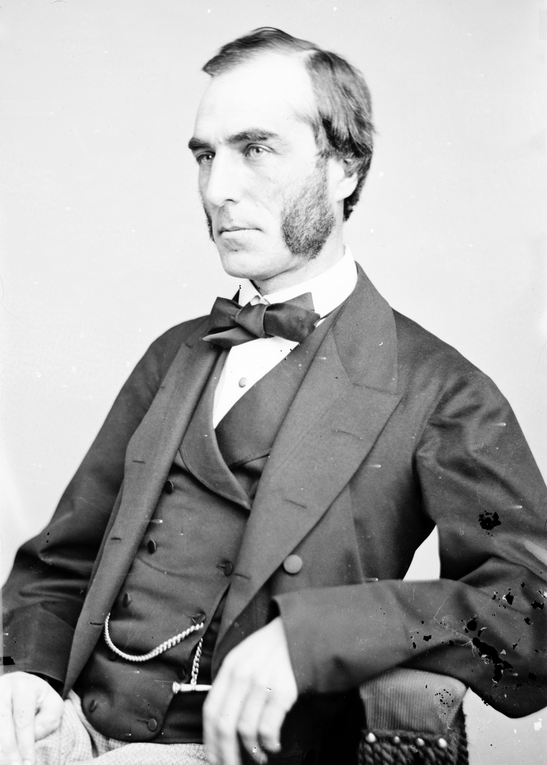
_______________________________________
[1] Antiaris toxicaria, whose sap was used to make poisoned arrows in Indonesia. In the author’s day a common literary metaphor for deadly poison. (ed.)

